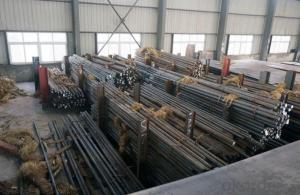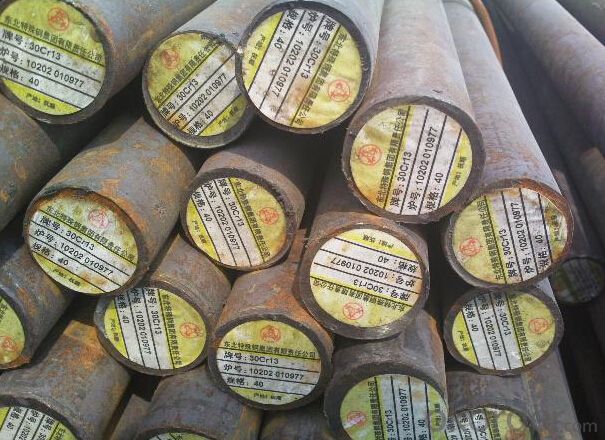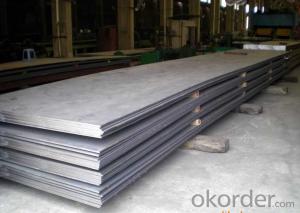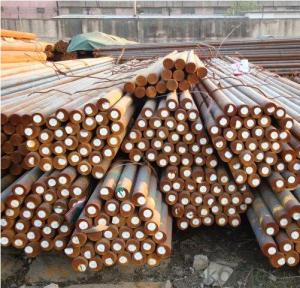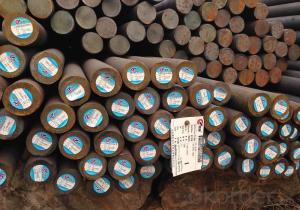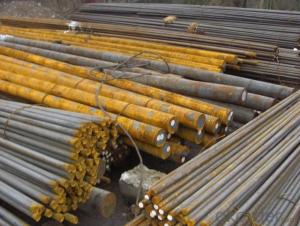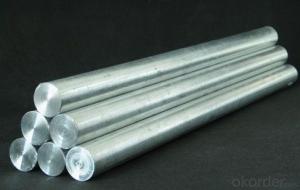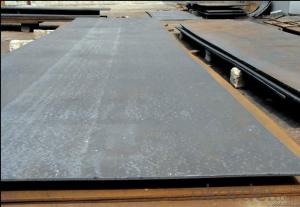Special Steel DIN 1.2601 High Carbon Steel
- Loading Port:
- China main port
- Payment Terms:
- TT or LC
- Min Order Qty:
- 25 m.t.
- Supply Capability:
- 10000 m.t./month
OKorder Service Pledge
OKorder Financial Service
You Might Also Like
Specification
The details of our Steel
1. Produce Standard: as the GB, AISI, ASTM, SAE, EN, BS, DIN, JIS Industry Standard
2. Produce processes: Smelt Iron -EAF smelt Billet - ESR smelt Billet -Hot rolled or forged get the steel round bar and plate
3. Heat treatment:
Normalized / Annealed / Quenched+Tempered
4. Quality assurance:
All order we can received Third party inspection, You can let SGS, BV,.. and others test company test and inspect our products before Goods shipping.
Product information
Chemical Composition(%)
Country | Standard | C | Si | Mn | Cr | Mo | V | S | P | W |
GB | C12MoV | 1.45-1.70 | ≤0.40 | ≤0.40 | 11.00-12.5 | 0.40-0.60 | 0.15-0.30 | ≤0.030 | ≤0.030 | |
DIN | 1.2601 | 1.55-1.75 | 0.25-0.40 | 0.20-0.40 | 11.00-12.0 | 0.50-0.70 | 0.10-0.50 | ≤0.030 | ≤0.030 | 0.40-0.60 |
Available Size
Rolled flat steel | 12-90mm×205-610mm×L |
Forged flat steel | 100-300mm×400-600mm×L |
Heat Treatment
Item | Temperature℃ | Hardness |
Anneal | 850-880 | ≤255HB |
Quenching | No.1:980-1040 | 60-63HRC |
No.2:1050-1130 | 42-50HRC | |
Tempering | No.1:200-300(1) | 57-60HRC |
No.2:200-300(2-3) | 58-62HRC |
Characterstics
1.High hardening ability and abrasion resistance | ||||||||
2.Less quenching deformation | ||||||||
3.Higher toughness and more homogeneous carbide distribution than Cr12 steel |
Applications: Suitable for various complicated cold working dies with high precision and long lifetime,such as punching dies,cold extrusion dies,thread rolling dies,screw plates,cold extrusion dies,and precise measuring devices
Product show

Workshop show

- Q: How does special steel perform in chemical resistance applications?
- Special steel performs exceptionally well in chemical resistance applications. It is specifically designed to withstand corrosion, oxidation, and other chemical reactions, making it highly resistant to various corrosive substances. Its unique composition and properties, such as high chromium and nickel content, provide excellent resistance to acids, alkalis, and other aggressive chemicals. This makes special steel an ideal choice for applications in industries such as chemical processing, oil and gas, pharmaceuticals, and food processing, where resistance to corrosion is crucial for long-term durability and safety.
- Q: What are the factors affecting the cost of special steel?
- There are several factors that can affect the cost of special steel. Firstly, the cost of raw materials used in the production of special steel, such as iron ore and alloys, can have a significant impact on its overall price. Additionally, the level of demand for special steel, both domestically and globally, can influence its cost. Factors such as market competition, economic conditions, and government policies can also play a role in determining the price of special steel. Lastly, the complexity of the manufacturing process, including the level of skill required and the use of advanced technologies, can contribute to the higher cost of special steel compared to regular steel.
- Q: Can special steel be used in the manufacturing of firearms?
- Yes, special steel can be used in the manufacturing of firearms. Special steel, such as stainless steel or alloy steel, offers enhanced strength, durability, and resistance to corrosion, making it well-suited for firearm construction.
- Q: How does special steel perform in erosion applications?
- Special steel is known for its exceptional performance in erosion applications. Its unique properties such as high hardness, corrosion resistance, and wear resistance make it highly suitable for environments where erosion is a common issue. Erosion is the gradual wearing away of a material due to the action of external forces such as abrasion, impact, or cavitation. In applications where erosion is prevalent, such as mining, oil and gas, and chemical processing industries, regular steel may not be able to withstand the harsh conditions and may quickly deteriorate. Special steel, on the other hand, is specifically designed to withstand erosive forces and maintain its structural integrity over an extended period. Its high hardness helps it resist abrasion and prevents the material from wearing down quickly. This makes it ideal for applications involving the movement of abrasive materials or fluids. Furthermore, special steel also exhibits excellent corrosion resistance, which is crucial in erosive environments. It can resist the corrosive effects of chemicals, moisture, and other harsh substances, ensuring the material's longevity and performance. In addition to hardness and corrosion resistance, special steel also offers exceptional wear resistance. It can withstand repeated impacts, high pressures, and sliding contact without significant damage, making it highly effective in erosion-prone applications. This wear resistance helps to minimize downtime and maintenance costs associated with material replacement or repair. Overall, special steel's properties make it a reliable and durable choice for erosion applications. Its ability to resist abrasion, corrosion, and wear ensures that it can withstand the demanding conditions often found in such environments, providing long-lasting performance and reducing the need for frequent replacements.
- Q: What are the different surface hardening techniques used for special steel?
- Some of the different surface hardening techniques used for special steel include case hardening, nitriding, carburizing, and induction hardening.
- Q: How does special steel contribute to the medical industry?
- Special steel contributes to the medical industry by providing the necessary materials for the production of medical equipment and devices. Its unique properties such as high strength, corrosion resistance, and biocompatibility make it ideal for manufacturing surgical instruments, implants, and prosthetics. Special steel also ensures the safety and effectiveness of medical tools, as it can withstand sterilization processes and maintain its integrity during procedures. Overall, special steel plays a crucial role in advancing medical technology and improving patient care.
- Q: How is carbon steel used in the manufacturing of pipes and tubes?
- Carbon steel is commonly used in the manufacturing of pipes and tubes due to its durability, strength, and cost-effectiveness. It is a versatile material that can withstand high temperatures and pressures, making it suitable for various applications such as oil and gas pipelines, water distribution systems, and structural supports. Additionally, carbon steel can be easily welded and fabricated, allowing for efficient production and customization of pipes and tubes to meet specific requirements.
- Q: How is nitriding steel used in surface hardening processes?
- Nitriding steel is used in surface hardening processes by introducing nitrogen into the surface of the steel, resulting in the formation of a hard and wear-resistant layer. This process enhances the surface properties of the steel, such as increased hardness, improved wear resistance, and improved corrosion resistance. Nitriding steel is commonly used in applications where high surface hardness and durability are required, such as in automotive components, industrial machinery, and tools.
- Q: How does special steel resist oxidation?
- Special steel resists oxidation due to the presence of alloying elements, such as chromium, that form a protective layer of chromium oxide on the surface of the steel. This layer acts as a barrier, preventing oxygen from reaching the underlying steel and thus inhibiting the oxidation process.
- Q: Can special steel be used in the medical field?
- Yes, the medical field utilizes special steel. Special steel alloys, including but not limited to stainless steel, find extensive application in medical and surgical instruments, implants, and equipment. Stainless steel is selected for its remarkable resistance to corrosion, exceptional strength, and enduring durability. It is commonly employed in surgical instruments like scalpels, forceps, and needles, as well as in orthopedic implants like bone screws and plates. Moreover, special steel alloys are employed in the fabrication of medical equipment such as MRI machines and X-ray tables, where high strength and magnetic properties are imperative. In summary, special steel plays a pivotal role in the medical field owing to its distinctive characteristics and capacity to meet stringent criteria for hygiene, safety, and dependability.
Send your message to us
Special Steel DIN 1.2601 High Carbon Steel
- Loading Port:
- China main port
- Payment Terms:
- TT or LC
- Min Order Qty:
- 25 m.t.
- Supply Capability:
- 10000 m.t./month
OKorder Service Pledge
OKorder Financial Service
Similar products
Hot products
Hot Searches
Related keywords
